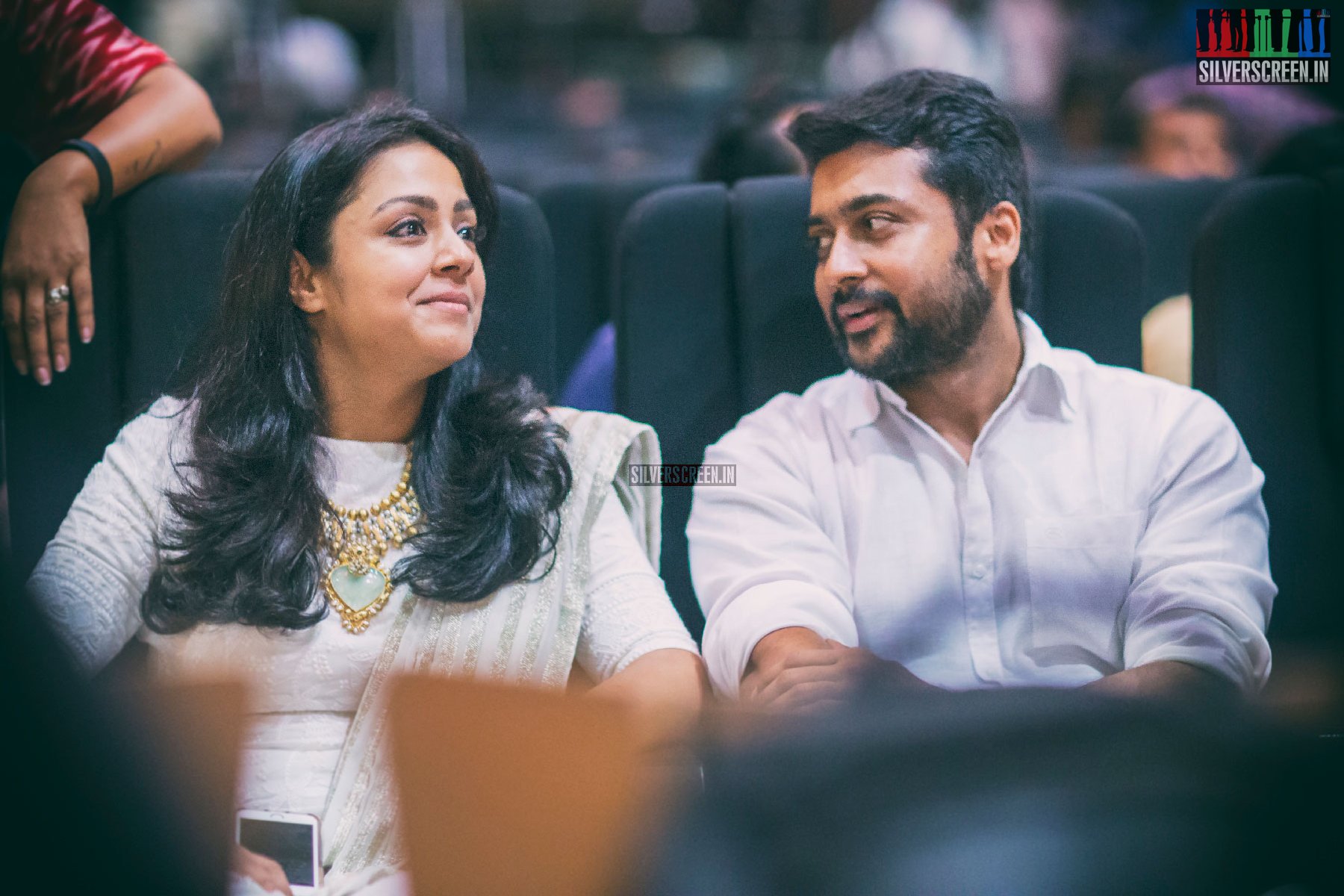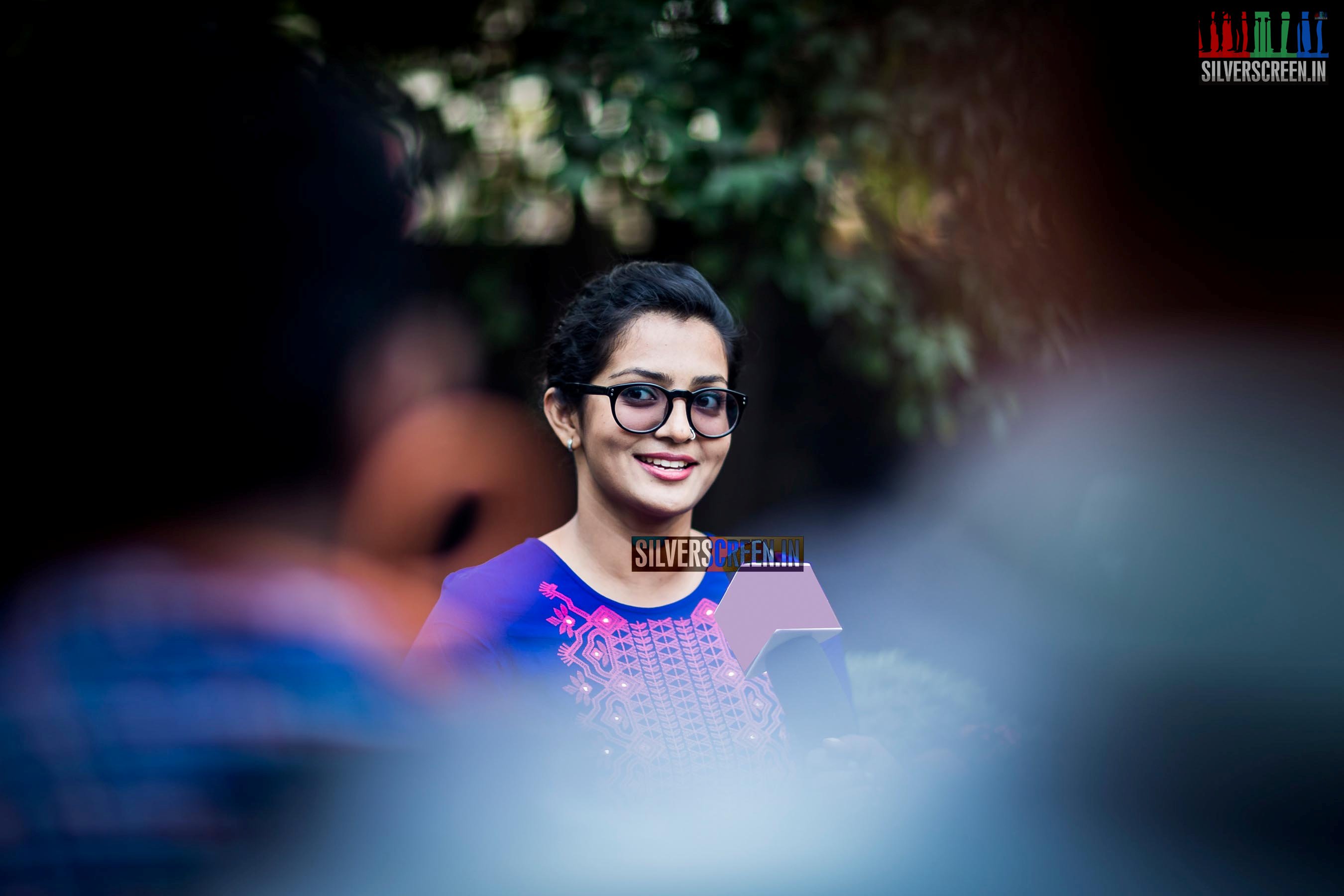Oru Naal Koothu, like last week’s release Iraivi, is centered around three women. But therein end the similarities. Where Iraivi – promoted as a feminist drama – showed its women through the eyes of its ensemble male cast, Oru Naal Koothu lets them stand on their own. There is no male lens to filter what we see, and we get to see them as they are. Individualistic. A little dramatic. The non-judgmental portrayal of the female characters reminds me of how K Balachander wrote his women: Individualistic, and a little dramatic.
*****
Lakshmi (Mia George) a timid woman from Trichy, who shudders when a guy even calls out her name. Her life is controlled by her father, who for several years has rejected every prospective groom that came her way. She is now inching towards her 30s, a dangerous age for a woman in a society that sees marriage as the ultimate fulfillment of her life.
Susheela (Riythvika), is a rather sullen Radio Jockey who smiles only when talking into her microphone. She is 28 and single, and tired of being judged for it. “Kalyanam aagala na..aagala avalodhan,” she says, (”I’m just not married, that’s all there is to it.”)
Finally, Kavya (Nivetha Pethuraj, a great find!)has it easier. Or does she? She works in a technology company and is in love with her boyfriend, Raj. (Attakathi Dinesh) But she’s rich, and he’s not. He wants time to get married, but it is not just her parents who are upset by the delay. She has needs too.
*****
In a very well written scene, Lakshmi meets an old friend of hers after years. The friend, bolder than Lakshmi then, would tell her to be friendlier with the boys. “Boys are nice people,” she’d assure her. She’s a single mother now. And Lakshmi tells her, “I wish you were a man, I would have gotten married to you.” The two then share a lesbian joke. The entire exchange feels natural, flowing organically into the joke at the end. We laugh with Lakshmi, happy that she finally found something in her sad life to laugh about.
*****
Not all the fathers in the film are tyrants though. Kavya’s dad wants her to get married to the man of her choice. He tells her she’ll be happier with someone equally rich, but recognises that the final choice is hers. He tells her that Raj – who has a family that is dependent on him – has his plate ( vaazhai ilai in his telling) too full to be able to live happily with her. Meanwhile Raj, with his own insecurities, cannot live guilt-free with Kavya. He is boxed in, and in his mind, he has no choice but to take care of a family he is not particularly fond of.
Another man breaks off his engagement with one of the three women because he feels that he decided hastily. It is not because he is scared of commitment or is a player. He is just confused. And there is no sermonizing to change his mind. Director (and writer) Nelson Venkatesan just lets it be.
It’s a refreshing thread that runs throughout the movie – the filmmaking leaves the judging of characters to us. Director (and writer) Nelson Venkatesan just lets things happen to his characters while manages to stay clear of Tamil’s favourite cliches: judgmental writing and black & white characters with nary a shade of gray.
*****
The three lead actresses fit their roles perfectly. Mia George’s acting is a delight to watch on screen. From quivering when a male classmate calls her name to when she stealthily calls a potential groom that she likes, she delivers a seasoned performance. Riythvika, in her first substantial role after her debut in Madras is memorable as the Radio Jockey who oscillates between effervescent and grumpy. But it is debutante Nivetha Pethuraj who steals the show. Her character at first seems to be cut from a template, but she shines as she walks the tightrope between love and reality.
The lead actor Dinesh essays his role in familiar fashion: by looking intense and unhappy. Dinesh’s filmography – Attakathi, Cuckoo – so far is riddled with roles that required him to be unhappy, and he carries over the affect in this film as well. His body language is identical across films – the reluctant glance when he looks at someone, the quivering in his voice as he speaks – that I wanted to tell him, “You really are normal in this movie. It’s okay to look up straight!”
*****
Recommended
I was initially sceptical about the use of a reprised version of the religious Shiva Keerthana Eppo Varuvano in the scenes where Lakshmi and Kavya are with prospective grooms. To compare attaining eternal salvation with getting married seemed like taking things a little too far; but as the film progresses we understand that the director is just telling us what marriage means to these characters. The movie is overly dramatic at times, and the loud thavil based background music by Justin Prabhakaran does not help. (His songs are a treat to listen to, though).
*****
After a climax that is open to interpretation, the end credits roll with people talking about marriage. Some call it poison. Others call it a blessing. It is up to you to choose what it means to you.
That’s how the movie is too.
*****



